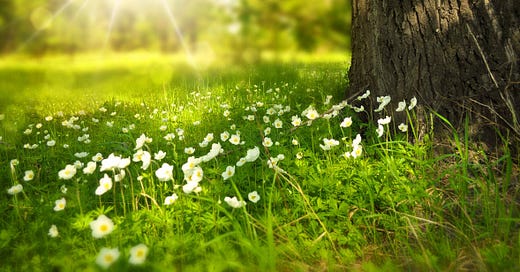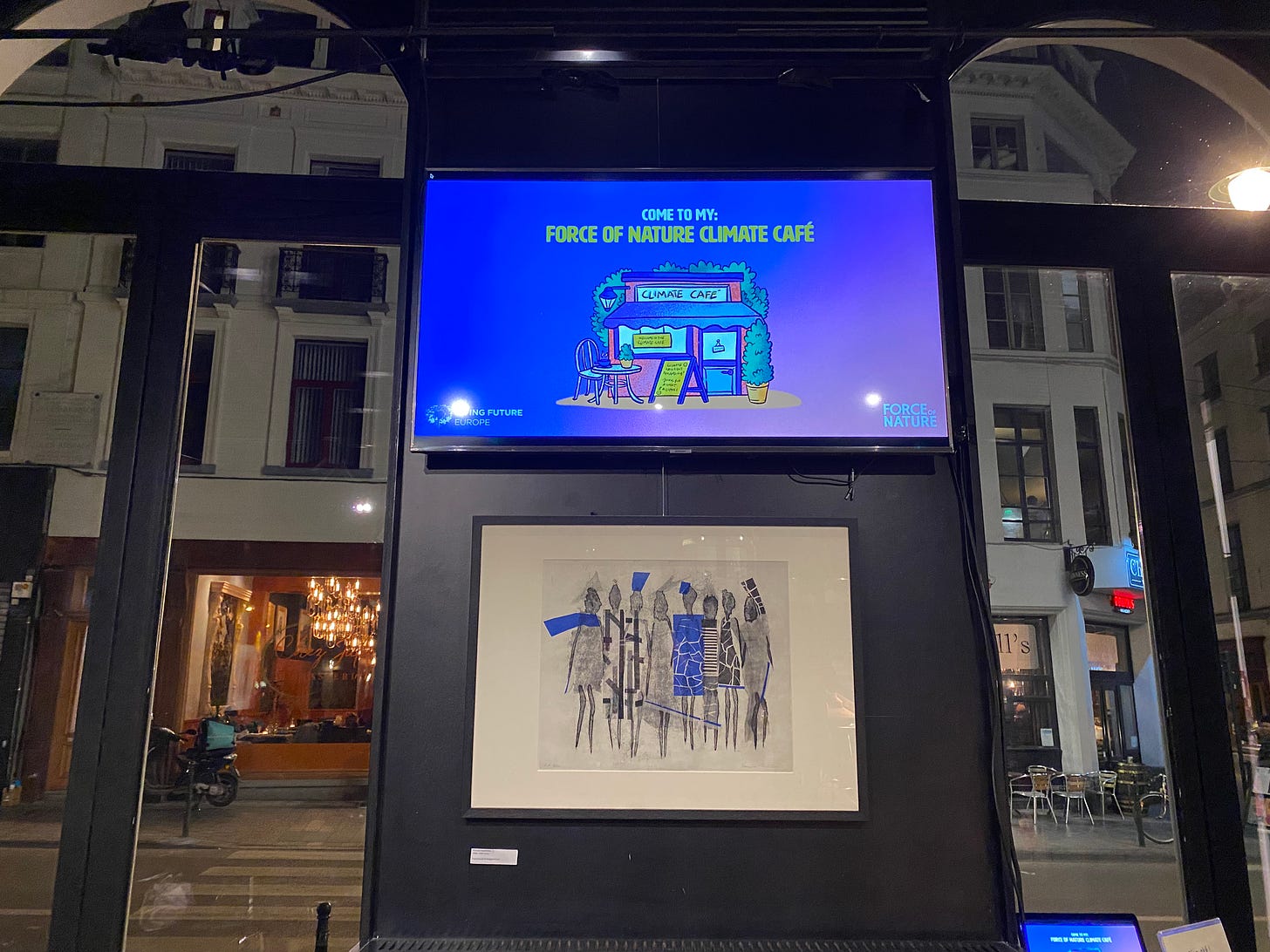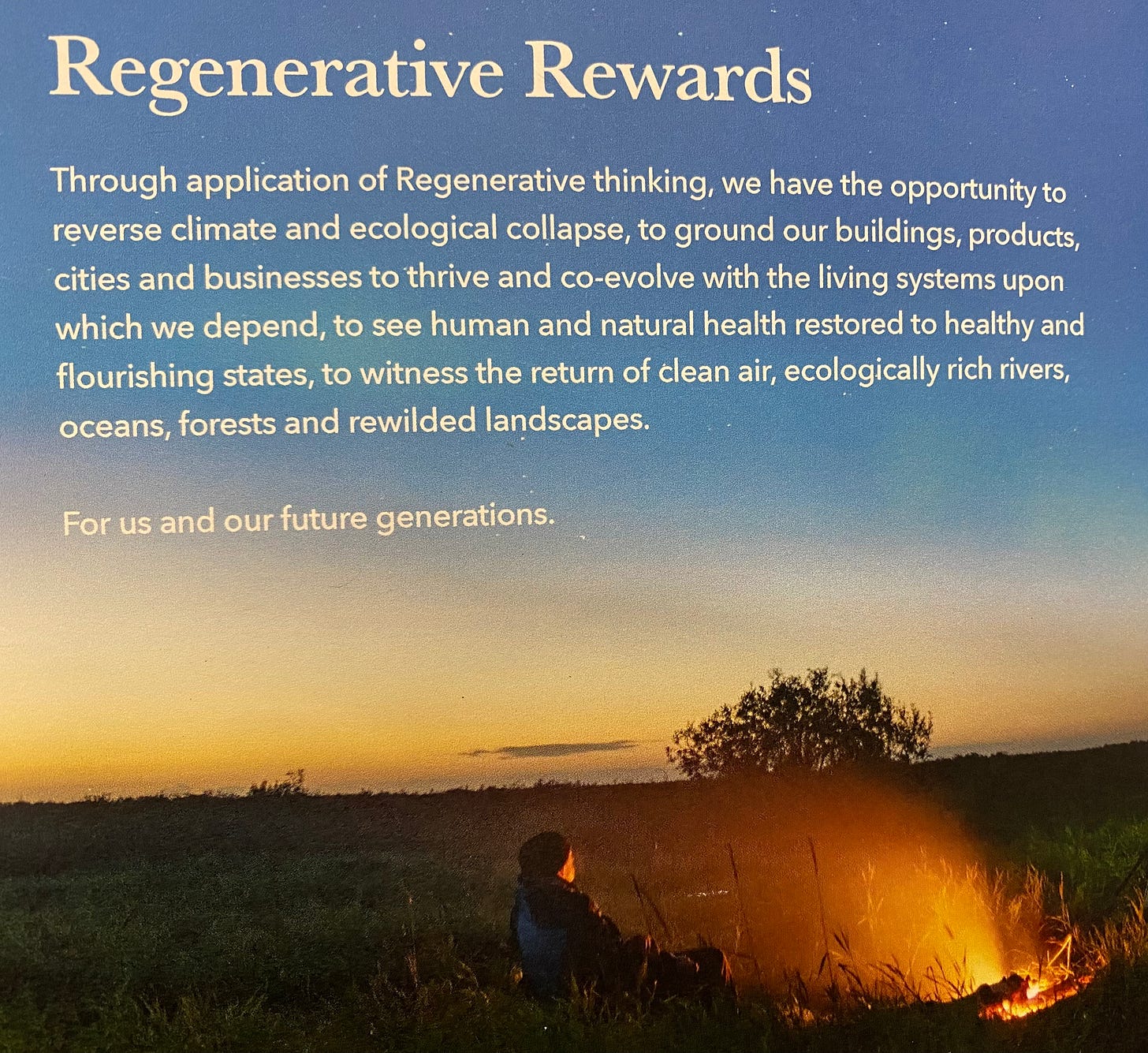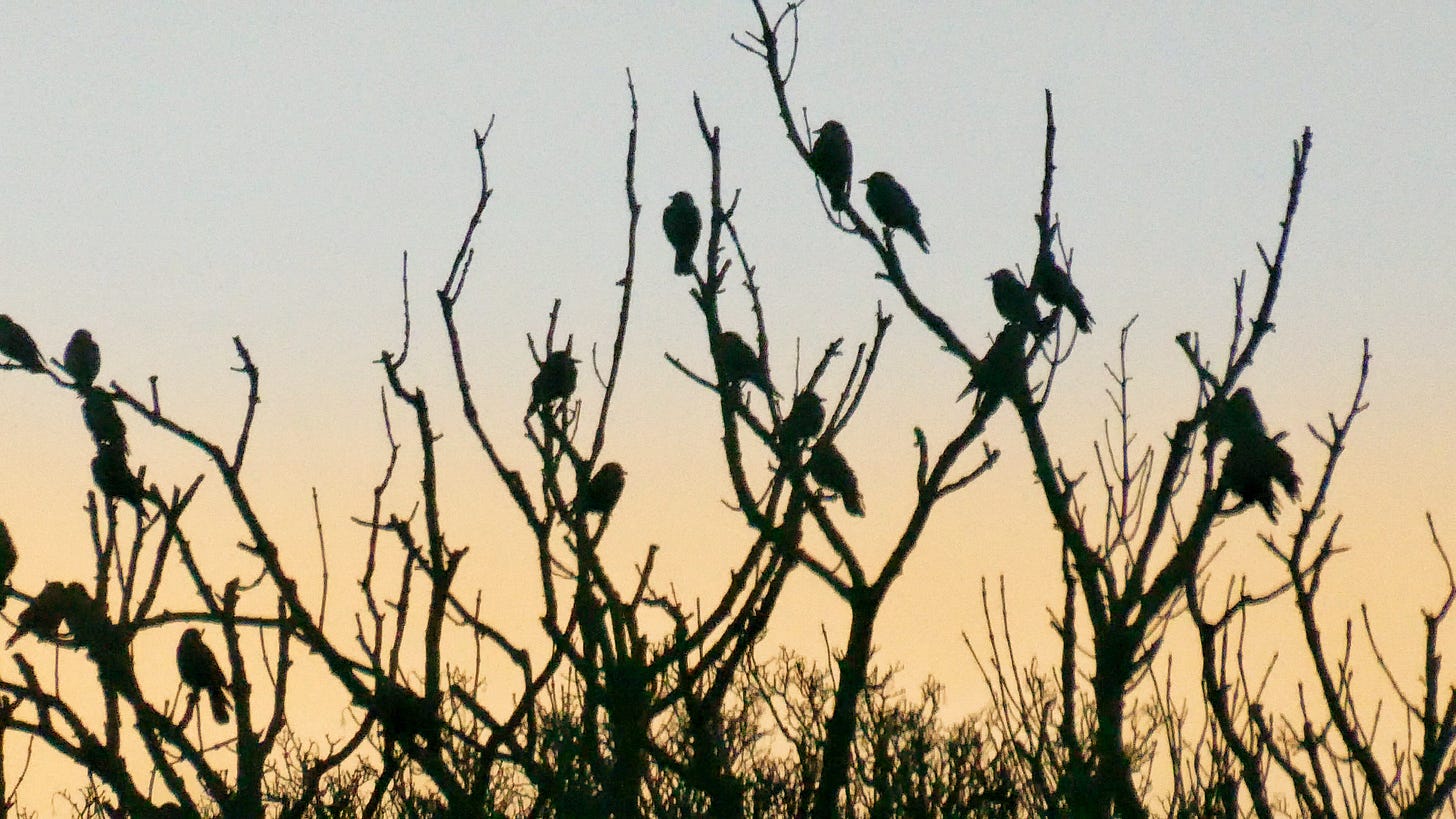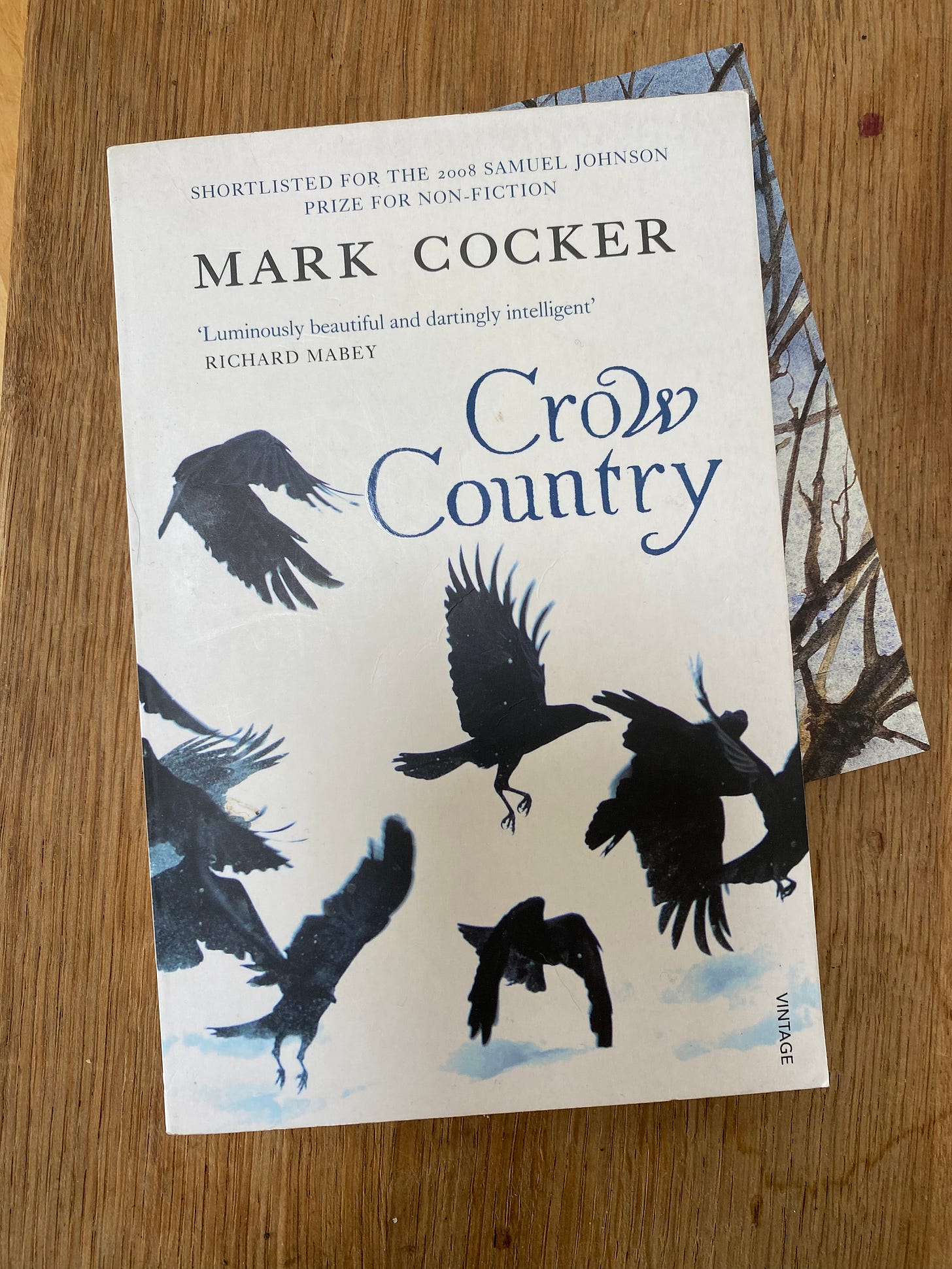Welcome to Regen Notes1.
UPDATE:
When I spoke and wrote up the transcript from the climate cafe, I had in mind the Living Building Challenge message of ‘what does good look like’. On reflection, and in the context of my regenerative thinking, this should be ‘what does good feel like’. We are not passive observers of what good is, but active participants, connected with good and therefore something we feel rather than look at. And not something that will happen without our active involvement.
I was honoured to be joining and talking at our Living Future Europe Climate Cafe Brussels in collaboration with Force of Nature on the 1 March.
On the theme of eco-anxiety, four speakers introduced a topic and posed a question in the cafe.
Jessica Antonisse - eco-anxiety, training young people on how to speak to lobbyists/MEPS, the importance of cross-collaboration and community
Salome Lehtman- experience of being a young person at COP27 dominated by multinational companies
Nicolas Remilien - policy innovation in the EU, start-ups entering the scene with solutions, to change the system use the system, interaction with EU policy, surprised with the amount of sustainable business case
Martin Brown - exploring the ‘Regenerative self’
Here is a transcript of my topic & my question.
“What wonderful, informed, passionate and vital conversations this evening.
I would like to change the conversation a little, to talk about us, me, the regenerative self.
Way back in the 1940’s Aldo Leopold2 wrote about being active in a wounded world. He talked about seeing wild geese as more important to him than owning a TV (remember this was the 1940s when TV was the latest new-fangled bit of tech to have - probably comparable with the latest phone or social media trend),
Aldo talked of the ability to see wildflowers as a universal right.
The fact you are here this evening demonstrates that you are active, yet aware of this wounded world, and I thank you for that, Aldo Leopold would thank you, the planet certainly thanks you.
When we talk about ‘regenerative’, it is not only what we do “out there”, what policies, standards and checklists we follow, but about ‘being’, about what and who we are “in here”. The regenerative self.
And for that we need to find time and space, we need to give time and space, for reflection and self-development. For me, that means being grounded and connected, through mindfulness, intentions and affirmations.
And on mindfulness, a while ago I came across the Ecosia eco-anxiety 10-day mindfulness programme on Insight Timer3 which I found very informative and useful, it is still available on the app and I would recommend it.
And it is also very important, for me, to spend time in nature, not only in the big landscapes of mountains and forests but in taking the time and noticing nature in detail, the lichen and mosses.
What first attracted me to the Living Building Challenge a decade or so ago, was its philosophy of asking a profound question - what does good look like? Having imagined ‘good’ then backcast and working towards and bringing that good into being. Shifting our buildings to be part of the climate solution, not remaining as part of the climate problem.
(In the Regenerative Playbook4, we conclude with ‘Regenerative Rewards’ as to what good can look like: "we have the opportunity to reverse climate and ecological collapse, to ground our buildings, products, cities and businesses, to thrive and co-evolve with the living systems upon which we depend, to see human and natural health restored to healthy and flourishing states, to witness the return of clean air, ecologically rich rivers, oceans, forests and rewilded landscapes. For us and future generations")
So my question for you this evening is - what does good look like to you?
I invite you to take a minute, take a little time and space to reflect on good, (take time to breathe and feel grounded if you are comfortable with that) and then to share in conversation - and importantly, how we bring that good into being”
A huge thanks to Alice Sparks and Carlo Battisti and others who brought this climate cafe to life, it was so good to meet up with and make new friends.
A natural climate cafe?
I would also like to share what I would now think of as a natural climate cafe, the gathering of crows for social learning. Over recent mornings I have watched rooks gathering at sunrise in a village oak tree, a truly mesmerising sight. OK, it may not be on the mass murmuration scale of gathering, but as the sun begins to rise, every morning, the birds have made their way to the oak, alone, in pairs or in small groups. Why?
Crows and rooks are highly intelligent and social birds, forming long-lasting social relationships. During such gatherings, it is possible they will exchange environmental information, such as food sources, predators, where is safe and where to avoid. This information sharing is seen as being crucial to the survival and well-being of the group.
It is well known that a flock of crows is known as a murder, and it is thought that when they lose one of the social groups to predators or road kill, they gather to share information to avoid the same happening to others
From this lovely experience of early morning crow watching, I have been re-reading Mark Cocker's book, "Crow Country," and I do recommend it. Mark Cocker came across a large flock of crows near his Norfolk home and tracked their journey north through England and Scotland. The book offers a glimpse into the lives of crows, the current state of rural life, and connections between us and birds.
Thinking biophilia
The Regen/Notes’ thinking biophilia journey continues … check out the earlier post here
Upcoming Events
Zoom Regenerative
ZR54 is on the 21 March with Sam Shaw sharing work on Greening the John Muir Way in Scotland and Tracey Hart feeding back on a question she asked at an earlier ZR around raising regenerative themes with a client (in this case Lake District National Park) Registration is open here on eventbrite
If you missed ZR53 with Taleen Josefsson, check the recap:
Biophilia Summit
Calls for papers and presentations for out Living Future Europe Biophilic Society Summit to be held on the 7th June is now open until the end of March. Details here.
Regen Notes is the companion newsletter to Zoom Regenerative.
If you enjoyed this post you can “buy me a coffee’ here
Previous articles on Regen/Notes can be explored here and the best of 2022 can be read here- ENJOY.
Aldo Leopold - Sand County Almanac
See Ecosia x Insight Timer https://blog.ecosia.org/ecosia-insight-timer-meditate-climate-anxiety/

